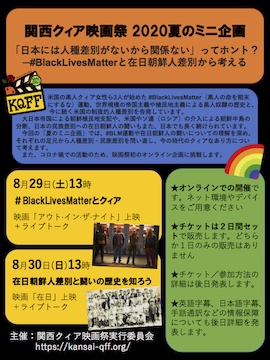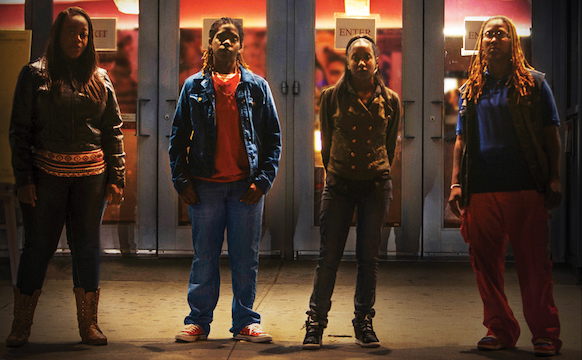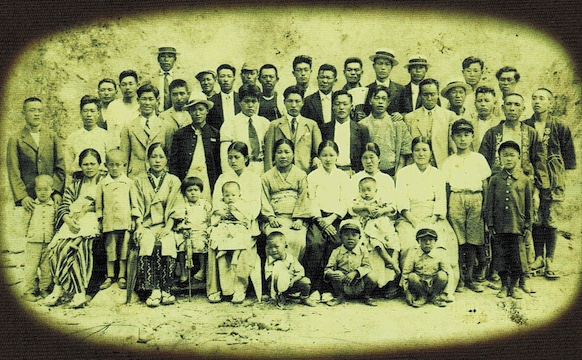Day 1: August 29 (Sat) 1PM-4:30PM
#“BlackLivesMatter and Queerness”
- Screening of film “Out in the Night”
- Talk on the Black Lives Matter movement (Speaker: Michelle Keane)
- Screening of film “Zainichi: The Story of Koreans in Postwar Japan (part 1)”
- Talk 1: Racism within sexual minority communities in Japan (Speaker: Makoto Hibino)
- Talk 2: Towards a Society where Everyone can Live Freely (Speaker: Wooki Park-Kim from Committee on the Elimination of Discrimination based on Gender and Sexuality)
About This Event

BlackLivesMatter is a movement founded by three black women: Patrisse Cullors , Alicia Garza, and Opal Tometi. Of the three, Cullors and Garza have openly stated that they are queer. They began the movement in 2013 in response to the murder of Trayvon Martin and the subsequent acquittal of his killer. In May of this year, following the death of George Floyd by white police officers, the movement was also covered and shared widely in Japan, leading to BLM marches in Osaka, Kyoto, and all over the country.
BLM has fiercely called out the history of the slavery of black people built upon global imperialism and colonialism, as well as the ungoing systemic racism in the United States. Recently, the movement has been raising the slogan “Defund the Police”, meaning relocate the funds given to the police towards human-centered services such as education, healthcare, housing etc.
In Japan, the racism towards Koreans* and their fight against it, can be seen as the equivalent of the BLM movement in the United States. Till this day, many Koreans are living in Japan, which can be dated back to the fact that Japan (Empire of Japan) colonized the Korean Peninsula. There are unsolved matters such as the lawsuits of wartime forced labor and issues concerning the “comfort women” of the Japanese Military, that keep haunting us today, as well as everyday issues that are rooted in institutionalized racism. The battle of Koreans in Japan has been ongoing, fighting against racism within Japan, and at the same time, confronting their history of the Korean Peninsula being divided by intervention from the US and the Soviet Union (Russia).
Through this summer’s event, by learning about the BLM movement in the US and the battle of Koreans in Japan, we aim to reflect on racial and ethnic discrimination through our everyday lives and rethink what it means to be queer in this day and age.
Also, this will be our first ever attempt at an online event as a film festival. We hope to challenge ourselves and keep exploring new forms of activity amidst the Covid-19 crisis.
*Korean residens in Japan are called "在日朝鮮人 Zainichi Chosen Jin" in Japanese, or so called "在日 Zainichi" in historically.
How much? / How to join?
- 1000 yen for 2 days (there is no one-day price)
- If you cannot pay due to financial difficulties, we offer a discount code for half the price.
- TICKET INFO is here: TICKET PURCHASE PAGE
- This event is completely ONLINE. Streaming will take up a considerate amount of bandwidth, so please prepare accordingly.
- We are planning on using Vimeo to show the films, and move to YouTubeLive for the talks following.
- Both films are available for rewatching for three days after the event, until September 3rd (Thursday) 0AM midnight JST, just in case you miss them! To folks who just want to watch the films: by paying the event fee, you are free to do so during the streaming period!
Accessibility
- "Out in the Night" will be screened with English language and Japanese subtitles.
- "Zainichi: The Story of Koreans in Postwar Japan '' will be screened with Japanese language, and both Japanese and English subtitles. You can choose your preferred subtitled version to watch.
- All talks after screenings will have Japanese-English translations (by Mai, Kumi)
- Japanese Sign Language is now under preparation.
Day 1
August 29 (Sat) 1PM-4:30PM
“#BlackLivesMatter and Queerness”
On day 1, we will first watch the film “Out in the Night” (screened at KQFF2016), and deeper our understanding of the situation that black queer women in the US are facing. Afterwards, a member of BLM Kyoto will give a talk on the BLM movement and racism against black people in Japan.

Film “Out in the Night”
Directed by Blair Dorosh-Walther
USA/2014/75 min
English language with Japanese subtitles
Screened at Kansai Queer Film Festival 2016
A lifetime demanding self-defense. One night they fought back.
In August of 2006, a group of lesbians that defended themselves against violence became “criminals”. A what-was-supposed-to-be-a-fun night of four black lesbians going out to the gay friendly neighborhood of New York City suddenly takes a turn when a passerby violently assaults them. Being Black, being a woman, and being a lesbian: when these three intersect, a simple act of self-defense becomes criminalized. The portrayal of them as a “Gang of Killer Lesbians” and their charges of “attempted murder” are a direct reflection of the way society views black lesbians.
What really happened that night? What went on in the courtroom? Why can’t we trust the police? How did the media cover this story? In this documentary, the answer to these questions will be revealed, through interviews of family, allies, and the group of 4 lesbians that become known as The New Jersey 4.
Talk on the Black Lives Matter movement (Speaker: Michelle Keane)

Being a member of Black Lives Matter Kyoto (BLM Kyoto), Michelle Keane will talk about the group and the BLM movement, how queerness relates to the movement, and experiences of racism towards black people in Japan.
Michelle Keane
A resident of Kyoto. Graduated from the Kyoto University of the Arts Visual Creation Field in 2019, completing a master's degree in Animation. Created a puppet animation for their graduation piece, focusing on the theme of racism. The film was nominated as one of the finalists of United For Peace Film Festival 2019. Originally from Jamaica.
Day 2
August 30 (Sun) 1PM-5PM
“The History of Racism against Koreans in Japan and their Battle to Fight it”
“Your Japanese is so good!” is the annoying response to “I’m Korean.” that more and more people are giving these days. This reality is the reflection that the historical reasons have become lesser known to our society, of why there are Korean residents in Japan, and how come there are Koreans who were born and raised here. On day 2, we will watch the film “Zainichi: The Story of Koreans in Postwar Japan” and learn about the history of Korean residents in Japan. Following that, there will be a talk on discrimination within the communities of sexual minorties in Japan, as well as a talk from a member of the Committee on the Elimination of Discrimination based on Gender and Sexuality of the Human Rights Association for Korean Residents in Japan.

Film “Zainichi: The Story of Koreans in Postwar Japan (part 1: History)”
Directed by Oh Deok-soo
Japan/1997/135min
Japanese language with Japanese subtitles and English subtitles
Yamagata International Documentary Film Festival 2005 Catalog
In August of 1945, Japan lost the war, liberating the Korean Peninsula from the colonial rule of Japan. This film depicts the following 50 years of “Zainichi” (Korean residents in Japan) and Japanese history, with copious stock footage and testimony.The first half of the film is called “History” and the latter half “People”, making up a 258 minute masterpiece. We will screen only the first half for this event.
Japan colonized Korea, and even after we lost the war, the country continues to consciously create and maintain a racist system against Korean residents in Japan and foreigners alike. The heaviness of this undeniable fact can be felt through the screen. If you choose to be ignorant of this history and stay silent, you are inevitably choosing to support the ongoing system of racism.
Jong-seok Park, Kyung-dok Kim, Chong-sok Han, and Jin-chul Lee. The voices of the “Zainichi” have created history. Let us listen and learn from each and every one of them.
Talk 1: Racism within sexual minority communities in Japan (Speaker: Makoto Hibino)

“Sexual minorities are also of Japanese nationality, so please don’t discriminate against us.” This kind of attitude of only thinking about Japanese people/Japanese nationals is prevalent within our very own communities. This talk will consider this issue by addressing the Diet interpellation session of 2010 by Daigo Matsuura (a member of the House of Councillors), as well as the decision made by the Japan Association for Queer Studies (JAQS) to only allow conference presentations in Japanese.
Makoto Hibino (Co-representative of Kansai Queer Film Festival)
Works of activism include but not limited to: calling out bisexual discrimination within lesbian and gay communities as a “bisexual”, speaking out about discrimination against transgender people as X gender*, holding an exhibition on the issues of the “comfort women” of the Japanese Military at the Rainbow Festa in Osaka, protesting US military bases against the US Consul General.
http://barairo.net/english/
*X gender is a Japanese term similar to terms such as gender non-conforming and non-binary.
Talk 2: Towards a Society where Everyone can Live Freely : A report from the Committee on the Elimination of Discrimination based on Gender and Sexuality (Speaker: Wooki Park-Kim)

“Towards a Society where Everyone can Live Freely” is the slogan raised by the Committee on the Elimination of Discrimination based on Gender and Sexuality of the Human Rights Association for Korean Residents in Japan. Based on these words, the committee holds gatherings called Pogumjari, for Korean women (Pogumjari ver.1) and for Korean sexual minorities (Pogumjari ver.2). They also hold classes on human rights at Korean schools, as well as public actions on the issues of the Japanese Military Sexual Slavery. A member of this committee, Wooki Park-Kim will share with us their actions and projects.
http://dareiki.org/
Wooki Park-Kim
A member of the Human Rights Association for Korean Residents in Japan, lecturer at Korea University, and singer. As a member of the Committee on the Elimination of Discrimination based on Gender and Sexuality, hosted events such as the 4.23 action in memory of the victims of the Japanese Military Sexual Slavery and gatherings for Korean women and sexual minorities. Has been holding lectures on gender and sexuality at Korean schools all over Japan, in recent years. Lead editor of the publication “Towards a Society where Everyone can Live Freely: Records of Lectures by the Committee on the Elimination of Discrimination based on Gender and Sexuality AND Result Report of the Survey on Gender Views of Fellow Korean residents in Japan” (2015).